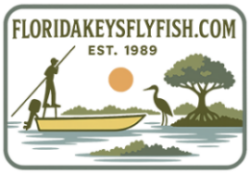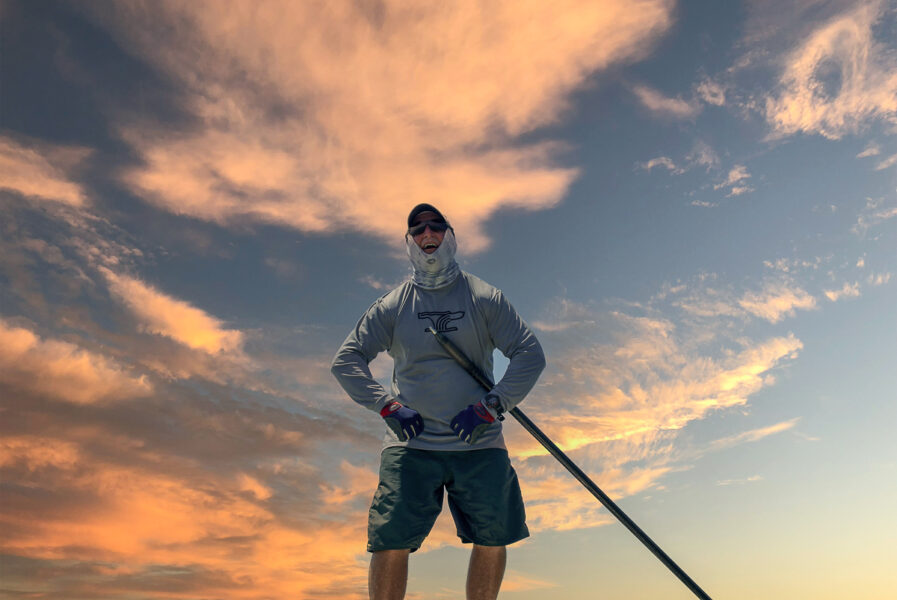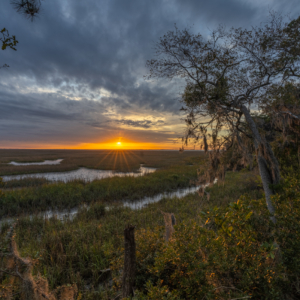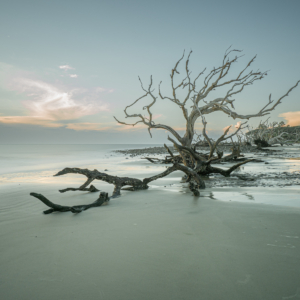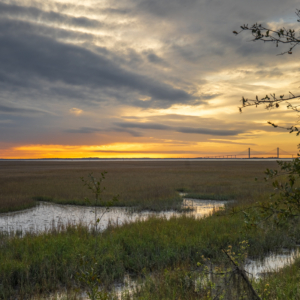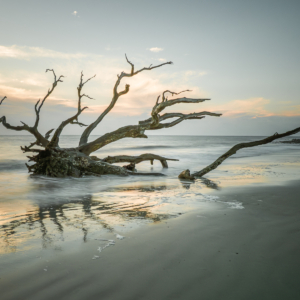Jekyll Island, GA
Jekyll Island is part of Georgia’s Golden Isles, a group of barrier islands along the southeastern coast of Georgia that also includes St. Simons, Sea Island, and Little St. Simons Island. It was once an exclusive retreat for America’s elite: the Rockefellers, the Vanderbilts, and the Pulitzers. Later, it became Georgia’s first state-owned island, preserved for the public. The historic district still stands, its beautifully kept homes and clubhouse whisper stories of an era long gone but not forgotten.
Camping beneath the island’s oaks in our Thor Compass, we couldn’t help but wonder what this place must have felt like in the past. The Horton House is the ruins of an 18th-century plantation next to our campground and nearby Driftwood Beach, lined with skeletal trees, and feels almost timeless. It’s no wonder filmmakers chose Jekyll for scenes in The Walking Dead (one of our favorite shows); its untouched landscapes add to the eerie, otherworldly feel. The island is also a photographer’s dream, with golden marshes at sunrise and sunset, ancient oak canopies covered in Spanish moss, and beautiful dunes and beaches that constantly change with the wind, tides, and ever-changing light. Fortunately, we have yet to encounter any walkers!
The speed limit on the island is mostly 25mph and doesn’t exceed 35mph, and the best way to get around is by bike or golf cart. More than 20 miles of fantastic biking trails wind through the island, leading past salt marshes, maritime forests, and beaches. We rode our mountain bikes on the wide, mostly shaded bike paths, encountering deer, countless shorebirds, the occasional gator, and very few humans. If you’re into golf, Jekyll has several excellent courses, including the historic Great Dunes course, but we were more interested in exploring on two wheels.
The surrounding waters offer excellent fishing, particularly on fly or light tackle. With St. Simons Island to the north and Cumberland Island to the south, the island sits within a network of rivers, tidal creeks, estuaries, and bars that hold redfish, speckled trout, and flounder year-round. In the warmer months, tarpon migrate through the area. The marshes and inlets provide opportunities to sight-fish for tailing redfish, making Jekyll an excellent destination for anglers looking for relaxation and a little excitement on and off the water.
Unlike most coastal communities, property on Jekyll Island isn’t privately owned in the traditional sense. The state of Georgia owns the land, and homeowners lease their property through long-term agreements rather than holding a deed. This arrangement helps preserve the island’s character by preventing overdevelopment and ensuring that Jekyll remains a balance of residential, recreational, and protected natural areas. While homeowners maintain and invest in their houses, they rent the land beneath them, a unique system that has helped the Island retain its charm and environmental integrity. The result? A place that still feels like an escape rather than a resort town.
For a small island, Jekyll has some great restaurants. The Wharf, set right on the river, serves fresh seafood with a view of the river and marsh, while Driftwood Bistro is a local favorite (and ours too) known for its shrimp and grits. Zachry’s Riverhouse offers a laid-back vibe with cold beer, burgers, or a catch-of-the-day menu.
Evenings at the campground are quiet, with only the rustling of the wind through the oaks and nearby marsh, the occasional dog barking, and the distant crash of waves at Driftwood Beach. Unlike its more developed neighbor to the north, Jekyll has resisted change, making it worth returning to – an island that holds onto its history while coexisting with nature.
